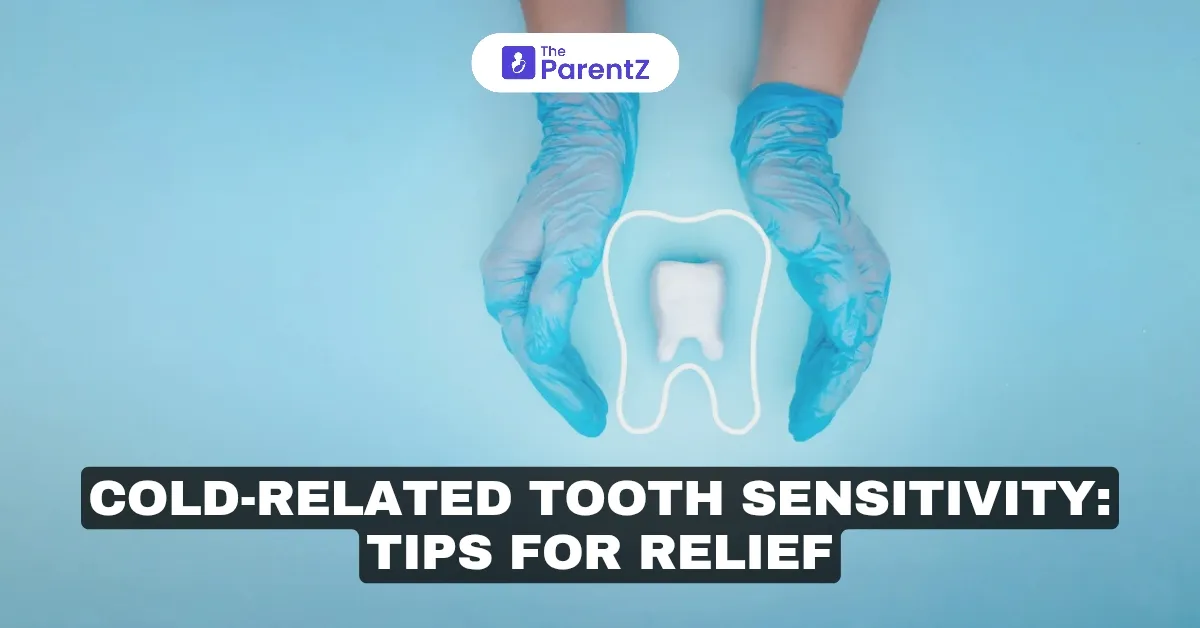Understanding Cold-Related Tooth Sensitivity in Children
Cold-related tooth sensitivity, also known as dentin hypersensitivity, is a common dental issue in children. It occurs when their teeth become sensitive to cold foods, drinks, or even cold air, leading to discomfort or sharp pain. This sensitivity is caused by the exposure of dentin (the inner layer of the tooth) due to enamel wear, gum recession, or cavities.
Many parents assume that tooth sensitivity is only a concern for adults, but children can also experience this condition. While occasional sensitivity is normal, persistent pain when consuming cold foods like ice cream or drinking chilled beverages may indicate an underlying dental issue that needs attention.
How is Cold-Related Sensitivity Different from Other Types of Tooth Sensitivity?
Tooth sensitivity can occur due to various reasons, but cold-related sensitivity specifically refers to pain triggered by exposure to cold substances. Here’s how it differs from other types of sensitivity:
1. Cold Sensitivity vs. Heat Sensitivity – Cold sensitivity is usually linked to enamel erosion or gum recession, while heat sensitivity often indicates deep cavities, infection, or nerve damage.
2. Cold Sensitivity vs. Sweet Sensitivity – Sensitivity to sweets often results from early-stage tooth decay, whereas cold-related sensitivity is primarily due to enamel thinning or exposed dentin.
3. Cold Sensitivity vs. Pressure Sensitivity – Pain while chewing or biting down may be due to cavities, fractures, or dental abscesses, whereas cold sensitivity is more commonly related to enamel erosion or gum problems.
Understanding these differences helps in identifying the right course of action for relief and treatment.
Causes of Cold-Related Tooth Sensitivity in Children
Several factors can lead to cold-related tooth sensitivity in children, including:
1. Enamel Erosion – Frequent consumption of acidic foods (such as citrus fruits, soda, and fruit juices) or improper brushing techniques can wear down the protective enamel, exposing the dentin.
2. Tooth Decay (Cavities) – Bacteria in the mouth produce acids that erode enamel and cause cavities, making teeth more sensitive to cold temperatures.
3. Gum Recession – Poor oral hygiene or aggressive brushing can cause the gums to recede, exposing the roots of teeth, which lack enamel protection.
4. Thin or Underdeveloped Enamel – Some children naturally have thinner enamel, making them more prone to sensitivity.
5. Dental Treatments – Teeth may become temporarily sensitive after dental procedures like fillings, crowns, or orthodontic adjustments.
6. Cracked or Chipped Teeth – Damage to teeth from injuries or chewing on hard objects can expose the inner layers of the tooth, leading to sensitivity.
How to Care for a Child with Cold-Related Tooth Sensitivity
If your child complains of tooth pain when eating or drinking cold foods, here are some ways to manage and relieve their discomfort:
1. Use a Soft-Bristled Toothbrush – Hard bristles can further wear down enamel and irritate the gums. A soft-bristled toothbrush is gentler on sensitive teeth.
2. Switch to a Desensitizing Toothpaste – Toothpastes designed for sensitive teeth contain ingredients like potassium nitrate or stannous fluoride that help block pain signals from reaching the nerves.
3. Encourage Gentle Brushing – Teach your child to brush using gentle circular motions instead of scrubbing aggressively, which can wear down enamel and cause gum recession.
4. Avoid Acidic Foods and Beverages – Reduce the intake of acidic foods like citrus fruits, soda, and vinegar-based snacks, as they can weaken enamel.
5. Ensure Proper Hydration – Drinking water helps wash away food particles and bacteria, reducing the risk of enamel erosion.
6. Limit Sugary Snacks – Sugar feeds bacteria that cause cavities, which can contribute to sensitivity. Encourage healthier snack options like cheese, yogurt, and nuts.
Preventive Measures to Avoid Tooth Sensitivity in Children
Prevention is always better than treatment. Here’s how you can help prevent cold-related tooth sensitivity in your child:
• Maintain Good Oral Hygiene – Ensure your child brushes twice daily with fluoride toothpaste and flosses regularly to prevent plaque buildup.
• Use Fluoride Treatments – Fluoride strengthens enamel and helps protect against decay. Your dentist may recommend fluoride varnishes or mouthwashes for added protection.
• Encourage the Use of a Mouthguard – If your child grinds their teeth (bruxism), using a night guard can prevent enamel wear and reduce sensitivity.
• Regular Dental Check-Ups – Routine visits to the dentist help detect and address potential dental issues before they worsen.
• Limit Cold Exposure – If your child experiences extreme sensitivity to cold air, covering their mouth with a scarf during winter months can help reduce discomfort.
How to Relieve Cold-Related Tooth Sensitivity in Children
If your child is experiencing sensitivity, here are some immediate and long-term solutions to provide relief:
Home Remedies:
1. Warm Saltwater Rinse – A warm saltwater rinse can help reduce inflammation and provide temporary relief from sensitivity.
2. Clove Oil Application – Dab a little clove oil on the affected area using a cotton swab. Clove oil has natural analgesic and antibacterial properties.
3. Cold Compress for Pain Management – If sensitivity is accompanied by gum swelling, applying a cold compress to the outside of the cheek may help reduce discomfort.
Professional Treatments:
1. Fluoride Gel or Varnish – A dentist can apply fluoride treatments to strengthen enamel and reduce sensitivity.
2. Dental Sealants – These protective coatings shield the teeth from external stimuli, preventing sensitivity.
3. Fillings or Bonding – If sensitivity is due to cavities or enamel wear, the dentist may recommend fillings or dental bonding to protect exposed areas.
4. Gum Grafts – In severe cases of gum recession, a gum graft may be necessary to cover exposed tooth roots and reduce sensitivity.
When to See a Dentist
While mild sensitivity can be managed with home care, persistent or severe pain requires professional evaluation. Schedule a dental visit if:
• Sensitivity lasts for more than a few weeks.
• Your child experiences pain even without consuming cold foods.
• There are visible signs of cavities, gum recession, or enamel erosion.
• Sensitivity is interfering with their eating habits or daily activities.
Conclusion
Cold-related tooth sensitivity in children can be a distressing experience, but with proper care, it can be effectively managed. By identifying the causes, implementing preventive measures, and seeking professional guidance when necessary, you can ensure your child enjoys a pain-free and healthy smile.
If your child complains about tooth pain from cold foods or drinks, don’t ignore it. A proactive approach to oral hygiene and regular dental check-ups can help prevent long-term dental issues.








Be the first one to comment on this story.